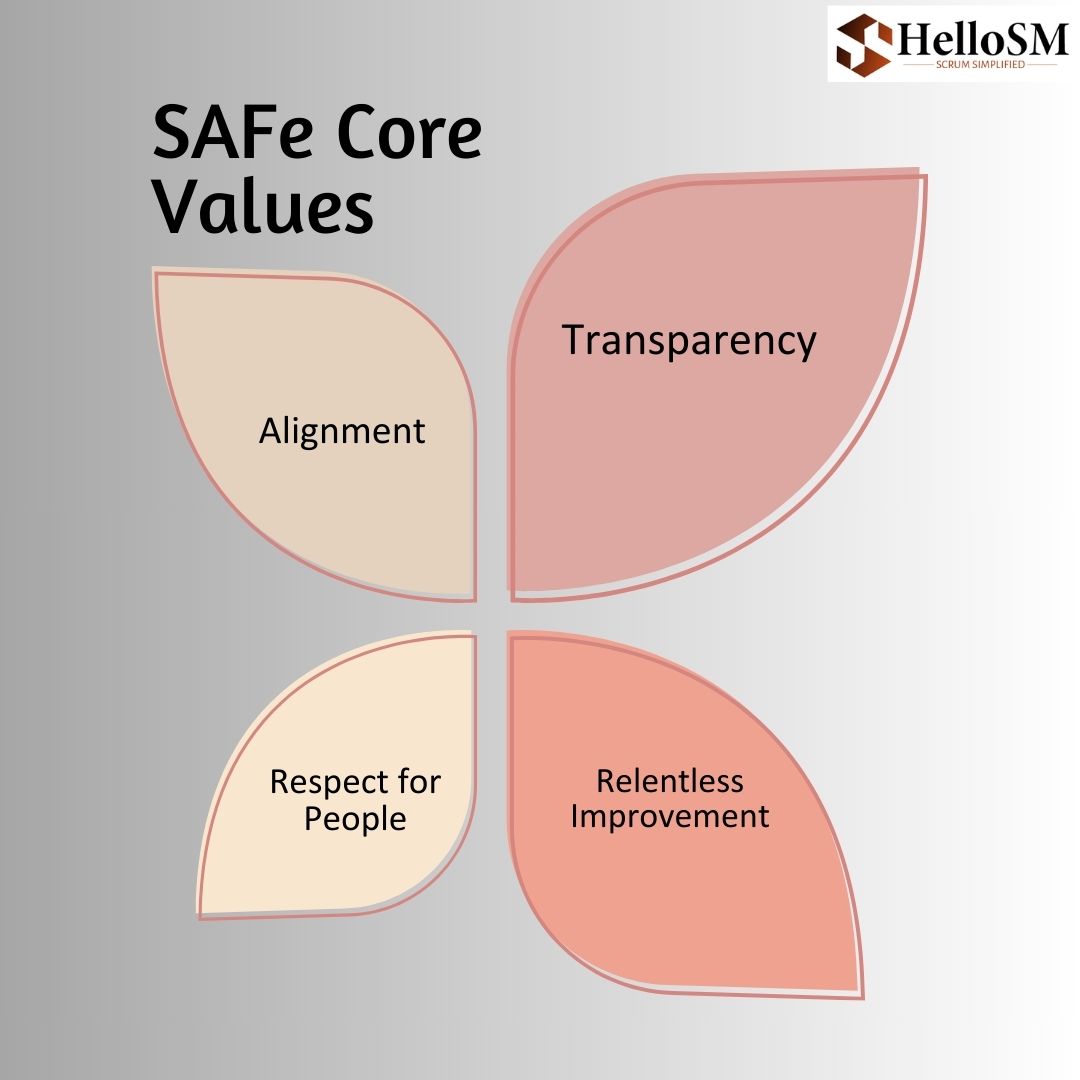The Scaled Agile Framework (SAFe) has become one of the most widely used approaches for scaling Agile across large organizations. Its popularity stems from its ability to align multiple teams, foster collaboration, and deliver value at enterprise scale. But beyond its roles, events, and artifacts, the foundation of SAFe lies in its four Core Values: Alignment, Transparency. Respect for People and Relentless Improvement.
For professionals in India who are planning to upgrade their Agile skills, these values are not just theory, they are essential practices. Choosing the right scrum training institute in India or a scrum training institute in Hyderabad, such as HelloSM, helps professionals not only understand these values but also apply them in real-world projects.
Alignment
As organizations grow, misalignment between teams becomes a common challenge. Different departments often pursue conflicting goals, leading to confusion and wasted effort. Alignment ensures that everyone from executives to delivery teams is working toward the same strategic vision. In SAFe, alignment is maintained through PI Planning sessions, shared roadmaps, and portfolio-level objectives. These mechanisms ensure that teams understand how their work contributes to business outcomes.
In India’s diverse IT landscape, where teams may be distributed across Hyderabad, Pune, or Bangalore, alignment is even more critical. Training at a scrum training institute in Hyderabad like HelloSM gives professionals practical tools to create alignment across multiple teams and stakeholders.
Transparency
Agility cannot thrive without trust, and trust is built on transparency. When progress, risks, and challenges are hidden, leaders make poor decisions, and teams lose confidence. Transparency allows everyone to see reality as it is, whether it’s good or bad. In SAFe, transparency is fostered through visible Kanban boards, objective metrics, open communication, and regular inspect-and-adapt sessions. This level of openness helps organizations take corrective actions before issues escalate.
However, many Indian companies face cultural barriers where employees hesitate to highlight problems out of fear of blame. This is where professional training becomes important. A strong scrum training institute in India helps participants practice transparency by building psychological safety and promoting honest conversations. HelloSM emphasizes transparency as a leadership skill, not just a reporting practice.
Respect for People
Agile is people-centric, and SAFe reinforces this by making Respect for People a core value. It means valuing individuals for their contributions, creating an environment of trust, and ensuring teams have autonomy to decide how to achieve their objectives. In practice, respect is shown by: Listening actively to feedback and ideas. Allowing teams to self-organize. Ensuring a sustainable pace of work to prevent burnout. Recognizing and celebrating individual and team achievements.
In India’s fast-paced IT sector, where deadlines often overshadow well-being, respect can easily be overlooked. Training with institutes like HelloSM reminds professionals that respect is not a luxury, it is the foundation for collaboration, innovation, and retention of talent.
Relentless Improvement
The final value, Relentless Improvement, highlights that agility is not about being perfect but about continuously evolving. Organizations must constantly reflect, adapt, and refine their processes to stay competitive in dynamic markets. SAFe encourages relentless improvement through retrospectives, Inspect and Adapt workshops, and a culture of experimentation. Instead of fearing failure, teams are encouraged to learn from it and use it as fuel for growth.
At a scrum training institute in Hyderabad, learners study real-world case studies where relentless improvement reduced waste and accelerated innovation. HelloSM in particular uses simulations and role plays to help participants develop a mindset of continuous learning and problem-solving.
Why These Values Matter for Indian Enterprises?
When applied together, these four values create a culture where enterprises can scale Agile effectively: Alignment ensures everyone moves in the same direction. Transparency builds trust and helps identify risks early. Respect for People strengthens collaboration and engagement. Relentless Improvement keeps organizations adaptive and innovative.
For professionals, choosing a scrum training institute in India can be the first step toward mastering these values. Institutes like HelloSM are well-positioned to bridge theory with practice, ensuring that learners not only understand SAFe but also know how to live its values in daily work.
The 4 SAFe Core Values, Alignment, Transparency, Respect for People, and Relentless Improvement form the backbone of any successful Agile transformation. For professionals and organizations in India, especially those exploring a scrum training institute in India or a scrum training institute in Hyderabad, these values are essential.
HelloSM offers the right platform to learn, practice, and implement these values. By mastering them, professionals can help their organizations achieve true business agility, higher customer satisfaction, and sustainable growth.
Frequently Asked Questions
What is the difference between Scrum values and SAFe core values?
Scrum values, Commitment, Courage, Focus, Openness, and Respect, apply to small teams. SAFe core values, Alignment, Transparency, Respect for People, and Relentless Improvement, apply at the enterprise scale where multiple teams collaborate.
How can I achieve Alignment in my organization?
Hold PI Planning sessions, create a unified roadmap, and ensure leadership shares a clear vision. A scrum training institute in Hyderabad like HelloSM teaches practical methods to drive alignment across distributed teams.
Why is transparency challenging in Indian companies?
Cultural hesitations, fear of hierarchy, and lack of safe spaces often prevent open communication. Training helps leaders build psychological safety so employees feel comfortable raising issues.
How can I demonstrate Respect for People at work?
Avoid micromanagement, encourage collaboration, support work-life balance, and celebrate contributions. Respect also means trusting teams to make decisions.
What does Relentless Improvement look like in practice?
It includes conducting retrospectives, experimenting with new approaches, measuring outcomes, and adjusting. It’s about a mindset of always asking, “How can we do better?”
Why should I choose HelloSM as a scrum training institute in India?
HelloSM combines expert trainers, real-world case studies, and interactive workshops. They focus not only on certifications but also on practical application, helping professionals and organizations truly embody SAFe’s values.

